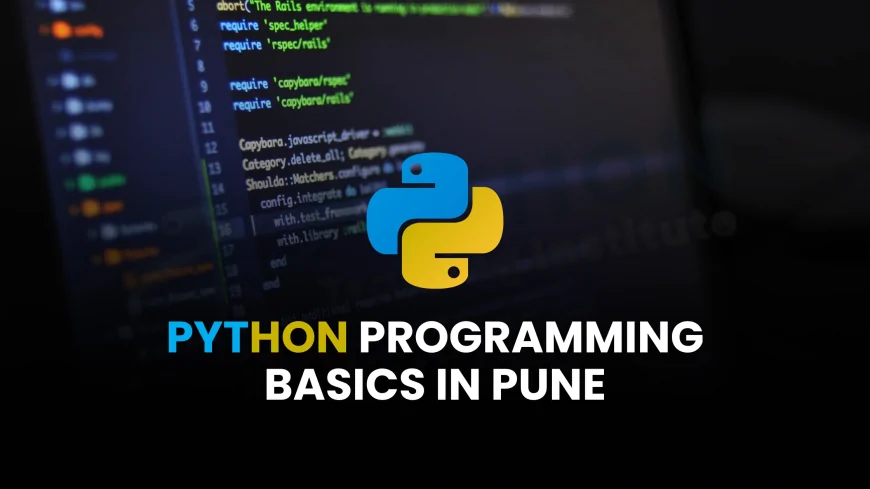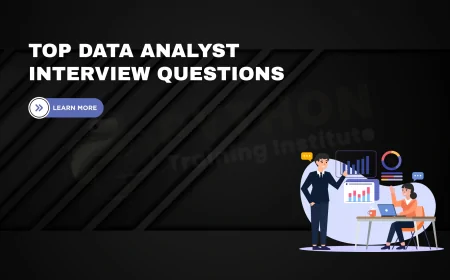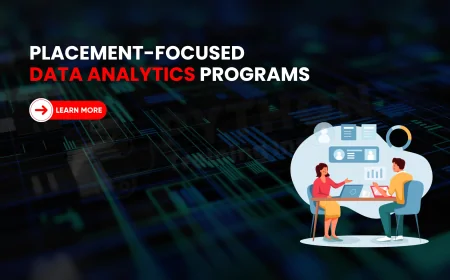Learn Python Programming Basics in Pune | Python Programming for Absolute Beginners – Pune
Learn Python programming basics in Pune with top-rated beginner courses, hands-on projects, and expert mentorship. Ideal for students, job seekers, and career changers.

Table of Contents
- Introduction
- Why Learn Python?
- Python Basics at a Glance
- Setting Up Your Development Environment
- Python Training Landscape in Pune
- Classroom vs Online Learning
- Sample Beginner Syllabus
- Hands-On Projects for Beginners
- Certification Pathways
- Career Paths After Basics
- Python Community & Meet-ups in Pune
- 30-Day Learning Roadmap
- Tips for Successful Learning
- Common Beginner Pitfalls
- Recommended Resources & Tools
- Typical Fees & Duration
- Internship & Placement Support
- Success Stories from Pune Learners
- FAQs
- Conclusion
1. Introduction
Pune—often dubbed the “Oxford of the East”—has evolved into a vibrant IT hub housing multinational companies, start-ups, and research labs. As demand for automation, data analysis, and rapid prototyping rises, Python has emerged as the go-to language for versatility and ease of use. This guide walks you through everything a complete beginner in Pune needs to know: from setting up Python to finding the right local or online class, plus answers to the most frequently asked questions.
2. Why Learn Python?
- Readable Syntax: Ideal for first-time programmers; code looks like English.
- Broad Applications: Web apps, data science, automation, AI/ML, and IoT.
- Vast Library Ecosystem: 400 000+ packages on PyPI.
- High Salary Potential: Entry-level Python developers in Pune earn ₹4–6 LPA; data-science roles start at ₹6–9 LPA.
- Strong Community: PyPune meet-ups, PyCon India, and local hackathons foster rapid growth.
3. Python Basics at a Glance
The “basics” cover core building blocks:
- Variables & Data Types (int, float, str, bool)
- I/O Operations (input, print, file handling)
- Control Flow (if-else, loops, comprehensions)
- Functions & Modules
- Error Handling with
try/except - Intro to Object-Oriented Programming (Classes, Objects)
Understanding these concepts sets a rock-solid foundation for web development, data analysis, and beyond.
4. Setting Up Your Development Environment
All you need is a decent laptop and internet connection. Follow these steps:
- Install the latest Python 3.12+ from python.org.
- Set up
pip(comes pre-installed) for package management. - Choose an IDE: VS Code, PyCharm Community, or JupyterLab.
- Create a virtual environment using
python -m venv venv. - Install essential packages:
pip install numpy pandas matplotlib.
5. Python Training Landscape in Pune
Pune boasts 150+ training providers—including institutes, universities, and freelance mentors. Broadly you’ll find:
- Intensive Bootcamps: 4–8 weeks, project-centric.
- Weekend Batches: Popular with working pros.
- University Electives: COEP Tech U, MIT-WPU.
- One-on-One Mentorship: Via UrbanPro, LearnPick.
6. Classroom vs Online Learning
| Classroom | Online | |
|---|---|---|
| Flexibility | Fixed schedule | Self-paced / live |
| Peer Interaction | High, in-person | Virtual forums |
| Infrastructure | Lab PCs | Your own setup |
| Cost | Slightly higher | 10-20 % cheaper |
7. Sample Beginner Syllabus
- Week 1: Python installation, IDE tour, Hello World.
- Week 2: Variables, operators, and data types.
- Week 3: Conditional statements & loops.
- Week 4: Functions and recursion.
- Week 5: Data structures—lists, tuples, dictionaries, sets.
- Week 6: File I/O and exception handling.
- Week 7: OOP basics—classes, inheritance.
- Week 8: Mini capstone (e.g., CLI expense tracker).
8. Hands-On Projects for Beginners
Projects accelerate learning:
- Number-Guessing Game: Random module + loops.
- Weather CLI: Consume OpenWeatherMap API.
- CSV Report Generator: Pandas for data cleaning.
- Simple Web Scraper:
requests+BeautifulSoup.
9. Certification Pathways
Popular beginner credentials:
- PCEP – Certified Entry-Level Python Programmer (Python Institute).
- Microsoft MTA Intro to Programming in Python.
- Institute-issued certificates (seed webashaTechnologies).
10. Career Paths After Basics
- Automation Engineer
- Write scripts to streamline tasks.
- Web Developer (Flask/Django)
- Build REST APIs and websites.
- Data Analyst (entry-level)
- Clean and visualise datasets.
- QA / SDET
- Leverage Python for test automation (Selenium, PyTest).
11. Python Community & Meet-ups in Pune
Join these to network and learn for free:
- PyPune: Monthly talks, code sprints.
- GDG Pune: Cloud & Python sessions.
- COEP Hackathons: Themed coding marathons.
12. 30-Day Learning Roadmap
- Days 1–3: Install Python, practise basic syntax on HackerRank.
- Days 4–10: Deep-dive loops, functions, and built-ins (30 min/day).
- Days 11–17: Small scripts (unit converter, password generator).
- Days 18–24: Data structures; finish two practice projects.
- Days 25–30: Build a mini capstone, push to GitHub, share on LinkedIn.
13. Tips for Successful Learning
- Code every day—even 20 minutes counts.
- Pair program or join study groups.
- Read other people’s code on GitHub.
- Document your journey—blogs, tweets, videos.
- Fail fast: embrace errors as feedback.
14. Common Beginner Pitfalls
- Ignoring virtual environments, causing package conflicts.
- Copy-pasting code without understanding logic.
- Overusing global variables.
- Skipping error handling.
- Not using version control (Git) from day one.
15. Recommended Resources & Tools
- Books: Automate the Boring Stuff with Python, Python Crash Course.
- Interactive: LeetCode, Codecademy, freeCodeCamp.
- Video: Corey Schafer, Tech With Tim.
- Cheat Sheets: Real Python’s quick-ref PDFs.
16. Typical Fees & Duration
- Bootcamps: ₹12 000 – ₹25 000 (6–8 weeks).
- Weekend Batches: ₹7 000 – ₹15 000 (2–3 months).
- One-on-One Mentoring: ₹800 – ₹1 200/hour.
17. Internship & Placement Support
Top institutes partner with local start-ups in Kothrud, Hinjawadi, and Kharadi IT Parks to provide:
- Mini-internships: 4-week remote projects.
- Placement drives: Resume reviews, mock interviews.
- Referral network: Alumni channels on WhatsApp and Discord.
18. Success Stories from Pune Learners
Aditi Kulkarni moved from customer support to a QA automation role after completing a 6-week Python basics bootcamp.
Sachin More landed a data-analysis internship at a fintech start-up in Baner following a weekend Python course and Github portfolio.
Frequently Asked Questions (FAQs)
1. Do I need prior programming experience to learn Python?
No. Python’s simple syntax makes it ideal for absolute beginners.
2. How long will it take to grasp the basics?
Consistent study (~1 hour/day) lets most learners grasp basics in 4–6 weeks.
3. What are the minimum laptop specs?
Any modern dual-core CPU, 8 GB RAM, and 5 GB free disk space.
4. Is Python enough to get a job?
For entry roles (QA automation, support engineering) yes; higher roles need frameworks or data skills.
5. Which IDE is best for beginners?
VS Code is lightweight; PyCharm offers rich autocomplete—choose what feels comfortable.
6. Are online courses as effective as classroom ones?
Yes, provided they include interactive labs and mentor support.
7. Will I learn data science in a basics course?
Typically no, but you’ll cover prerequisites like lists, loops, and files.
8. Do Pune institutes offer trial classes?
Most bootcamps provide a free demo session—always attend before enrolling.
9. What certificates add value?
PCEP (Python Institute) is recognised globally and useful for resumes.
10. Can I learn Python in Marathi or Hindi?
Yes—several trainers in Pune teach bilingually.
11. Are evening batches available?
Yes, common slots are 7 pm–9 pm IST on weekdays.
12. Should I start with Python 2 or 3?
Always Python 3; Python 2 reached end-of-life in 2020.
13. What is the difference between a bootcamp and weekend course?
Bootcamps are immersive and shorter; weekend courses spread content over months.
14. Do institutes help with resume building?
Leading institutes include resume and LinkedIn optimisation modules.
15. How do I practise outside class?
Code challenges (LeetCode), small GitHub projects, and hackathons.
16. Will I need maths for basic Python?
Only elementary arithmetic; advanced maths is for data science tracks.
17. Can students pay fees in instalments?
Many institutes partner with finance firms for EMI options.
18. What if I miss a class?
Most online courses provide recordings; classroom batches allow catch-up sessions.
19. Which libraries should I learn after basics?
Start with requests, pandas, and Flask based on your interest area.
20. Where can I showcase my projects?
GitHub, LinkedIn posts, and local PyPune lightning talks.
19. Conclusion
Mastering Python basics is the smartest first step toward a tech career. Pune’s rich ecosystem of institutes, mentors, and vibrant tech meet-ups makes learning engaging and career-focused. Choose a training format that fits your schedule, practise daily, build small projects, and contribute to the community—you’ll be surprised how fast “Hello World” turns into real-world code.
What's Your Reaction?
 Like
0
Like
0
 Dislike
0
Dislike
0
 Love
0
Love
0
 Funny
0
Funny
0
 Angry
0
Angry
0
 Sad
0
Sad
0
 Wow
0
Wow
0















